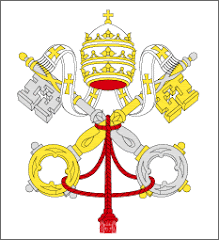Materialism, being the raison d’etre of our present society, has proven itself to be the driving force for most decisions of most people. It is embraced as the means by which to obtain security, albeit an extremely false security as it is sought in that which is devoid of Truth.
Security is freedom from fear and anxiety as well as freedom from the danger of loss. This is clearly a good in the truest sense. There is not a sane person alive that would opt for insecurity over security. While understanding of how to obtain it may differ profoundly from one person to the next, the fact remains that security is good by its very nature.
To hold that security is good by its very nature should lead one to an even greater understanding of both God and security. Being that God is all-good, it is safe to conclude that the nature of security, which is good, receives its goodness from a certain source, that is, Security Itself – God. God also being Truth would necessitate that security can only be found in Truth. Through a simple method of substitution, we come to the realization that to be united to God is to be united to Security; in God, there is no fear or anxiety, nor is there any danger of loss. Conversely, to be separated from God (Truth) is to be united to fear, anxiety, and loss.
On a practical level, one can quickly ascertain the effects of materialism on the prevailing understanding of security and the means by which to obtain it. What is the reason that we buy and consume at an almost obsessive level? Why must our houses be turned into warehouses for our ever-expanding collection of stuff (for which we pay a great price) instead of a home for an ever-expanding family? The answer is that there is a certain perception of good in the possession of many things: increase in social status, establishment of a certain reputation, and an increase in options by which we amuse ourselves. Ultimately, these things are seen as synonymous with security – security for one’s reputation and social status, security in one’s ability to provide for oneself or family, even security to possess more through the inordinate amount of work done in order to make money that will be used to buy even more stuff.
The fundamental problem in the above philosophy is that the very thing that it seeks is the very thing that it destroys. It seeks security as the ultimate goal, yet in amassing a great collection of goods, that person has only increased the potential for loss. For the materialist, the greatest good is the possession of many things; therefore, the greatest fear of the materialist must necessarily be the loss of those things. At this point, what should be clear is that materialism is marked by increased danger of loss and the accompanying fear and anxiety. This marks the complete loss of security. In fact, one of the most telling signs of the insufficiency of materialism at gaining security is the constant need to gain more….and more….and more. Why more if security has been achieved? Can we not rest on our laurels once we’ve arrived at the goal? Clearly, the Goal has not been achieved. It has been avoided completely, and it is this Goal that haunts those who insist on substituting Him with every form of idol known to man, from statues in the ancient world to sex and money today. Francis Thompson may be the poster-child for this essay. In The Hound of Heaven, he wrote:
“I hid from Him, and under running laughter.
Up vistaed hopes I sped;
And shot, precipitated,
Adown Titanic glooms of chasmed fears,
From those strong Feet that followed, followed after…
They beat – and a Voice beat
More instant than the Feet –
‘All things betray thee, who betrayest Me.’”
To seek security in anything but the very source is to deny ourselves of that which we seek. Indeed, the more we seek it elsewhere, the more bitterly it flees and betrays us. We have assurance of the converse in the words of the Word Itself: “Seek first the Kingdom of God and all these things shall be added unto you.” In the non-canonical but creatively poetic words of Thompson, He reveals Himself to us as the goal that we desperately seek yet at the same time exclude in the words:
“Ah, fondest, blindest, weakest,
I am He Whom thou seekest!
Thou dravest love from thee, who dravest Me.”
12 years ago



















No comments:
Post a Comment